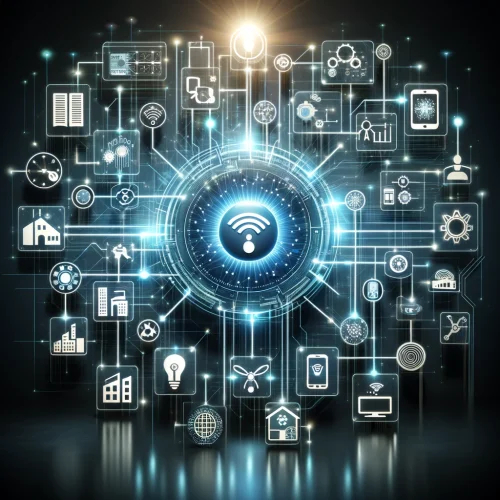
AI for IoT
Skills you will gain:
The AI for IoT: Intelligent Integration of AI with the Internet of Things course offers a specialized 10-week program designed to integrate Artificial Intelligence with the Internet of Things. Aimed at students and early career professionals in tech-related fields, the course features comprehensive lectures, practical labs, and real-world case studies in sectors like healthcare and urban planning. Participants will learn to design, deploy, and optimize AI-driven IoT solutions, gaining hands-on experience and a certificate of completion that attests to their expertise in this cutting-edge area.
Aim: The course aims to equip students and early career professionals with the essential knowledge and practical skills needed to design, deploy, and optimize AI-driven solutions within the IoT infrastructure. By focusing on hands-on applications and real-world case studies across multiple industries such as healthcare, urban planning, and manufacturing, participants will learn to implement advanced AI algorithms that enable IoT devices to perform automated decision-making, improve operational efficiency, and introduce new services. The course aims to foster a deep understanding of the synergistic potential of AI and IoT technologies, preparing participants to lead and innovate in this dynamic and technically demanding field.
Program Objectives:
What you will learn?
Module 1: Introduction to AI and IoT
- Section 1.1: Overview of Artificial Intelligence
- What is AI?
- History and Evolution of AI
- Section 1.2: Basics of the Internet of Things (IoT)
- What is IoT?
- Key components and architecture
- Section 1.3: Convergence of AI and IoT
- Opportunities and challenges
- Impact on industries
Module 2: Data Handling and Analytics
- Section 2.1: Data Collection in IoT
- Sensors and data acquisition
- Data quality and filtering
- Section 2.2: AI for Data Analysis
- Machine learning models
- Real-time data processing
- Section 2.3: Data Storage and Management
- Cloud and edge computing solutions
- Data security and privacy
Module 3: AI Technologies for IoT
- Section 3.1: Machine Learning Techniques
- Supervised and unsupervised learning
- Reinforcement learning in IoT contexts
- Section 3.2: Deep Learning and Neural Networks
- Applications in image and speech recognition
- Predictive maintenance
- Section 3.3: Natural Language Processing (NLP)
- Voice assistants and chatbots in IoT
Module 4: IoT Development Platforms and Tools
- Section 4.1: IoT Platforms Overview
- Commercial and open-source platforms
- Section 4.2: Integrating AI with IoT Platforms
- APIs and middleware
- Developing intelligent IoT devices
- Section 4.3: Case Studies and Industry Applications
- Smart cities, healthcare, and manufacturing
Module 5: Project and Industry Applications
- Section 5.1: Designing AI-IoT Solutions
- Problem identification and solution design
- Section 5.2: Implementation Challenges
- Scalability, interoperability, and regulatory considerations
- Section 5.3: Project Presentation and Evaluation
- Final project submission and peer review
Intended For :
The course is specifically designed for:
- Students:
- B.Tech, M.Tech, and M.Sc students who are specializing in fields such as Computer Science, Information Technology, and Electronics. This course is suitable for those at an intermediate to advanced level of their technical education who are looking to deepen their understanding of AI and IoT technologies.
- Early Career Professionals:
- Individuals who are in the early stages of their careers in IT services, consulting, and Fintech IT services. This course is ideal for professionals seeking to enhance their skills and knowledge in cutting-edge technologies and looking to apply AI solutions in real-world IoT scenarios.
Career Supporting Skills

